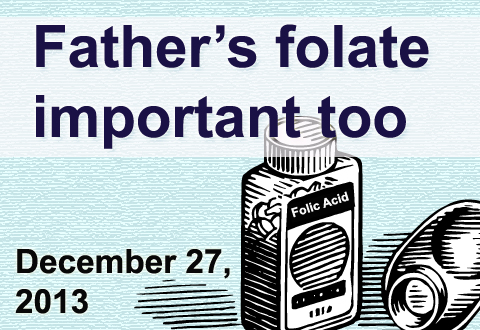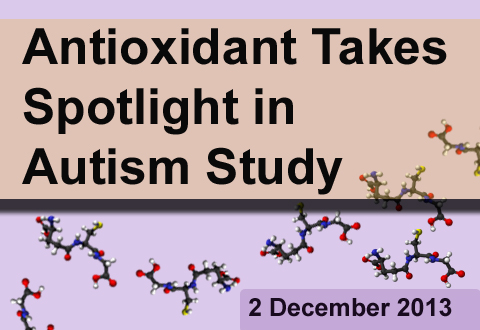Archives
December, 2013
Select a different month in the archive
Male Folate Intake Linked to ASD-Related Gene Expression
By Chelsea E. Toledo, M.A. on December 27, 2013

Background: Epigenetic modifications are those that alter DNA’s properties without changing the actual sequence. These alterations make it more or less likely that a gene will be expressed. Recently, researchers have been exploring whether epigenetic information, which is influenced by environmental factors, can be passed from parents to offspring.
What’s New: On December 10, 2013, a study in the journal Nature Communications evaluated the role of fathers’ intake of folate—a form of vitamin B—in their offspring’s development. Researchers exposed male mice to varying levels of folate from the time they were in utero; 49 received sufficient amounts of the nutrient, and 54 were folate-deficient. After breeding them, they found that the offspring of folate-deficient mice had greater epigenetic abnormalities in the genes related to diabetes, autism spectrum disorder (ASD), schizophrenia, and cancer.
Why it’s important: This study suggests that a father’s diet can influence the health of his resulting children, at least in mice. While further research is needed, the findings tout proper folate intake in men as a possible factor to help prevent ASD-related gene expression in children.
Help me understand :
| Source(s) : |
| Tweet |
Multi-Year Study Follows Sleep Difficulties in ASD
By Shana R. Spindler, Ph.D. on December 18, 2013

Background: According to several studies, children with Autism Spectrum Disorder (ASD) are more likely to have sleep problems than typically developing children. These include reduced sleep, night waking, early morning waking, nightmares, and the lack of a sleep routine. It is important to understand sleep difficulties in ASD as they can negatively affect daytime behavior.
What’s new: In a study that followed over 10,000 English children for 11 years, researchers from the UK and Canada recorded sleep patterns of children from six to 140 months of age. Of those children, 73 were eventually diagnosed with ASD. Children with ASD slept on average 43 minutes less than typical children at 81 months of age. The decreased sleep times began around 30 to 42 months of age and lasted until adolescence.
Why it’s important: This study highlights the need for parents to evaluate sleep problems in children with ASD from an early age. If sleep problems persist, parents can discuss therapeutic options with their doctor.
Help me understand :
| Source(s) : |
| Tweet |
Oxytocin Ups Social Brain Activity in Children with ASD
By Chelsea E. Toledo, M.A. on December 10, 2013

Background: Oxytocin is a hormone most commonly associated with childbirth and lactation, and recent studies have explored its role in maternal, romantic, and social bonding. For instance, when given oxytocin through the nose, typically developing adults showed improvement in eye contact, trust, and reading emotions from facial expressions.
What’s New: On December 2, 2013, the Proceedings of the National Academy of Science (PNAS) published a paper exploring the cognitive effects of oxytocin in children with autism spectrum disorder (ASD). In a randomized, double-blind study, the researchers assigned 17 children aged eight to 16.5 to receive a single oxytocin nasal spray or a placebo. Brain scans of children in the treatment arm showed increased activity in certain areas of the brain when the researchers asked them to assess expression in photos of eyes. The brain areas with increased activity included those associated with motivation, higher information processing, sleep, decision-making, and social perception. Activity of the same brain areas decreased in participants who received oxytocin when they were asked to categorize images of automobiles.
Why it’s important: While it used a small sample size, this study demonstrates that therapeutic oxytocin might help children with ASD respond more appropriately to social versus non-social stimuli.
Help me understand :
| Source(s) : |
| Tweet |
Up Antioxidant Activity To Improve Behavior, Study Says
By Shana R. Spindler, Ph.D. on December 2, 2013

Background: Some children with autism have deficits in antioxidant activity, which normally detoxifies cells. An antioxidant is a molecule that is capable of neutralizing damage causing free radicals—most people know of the antioxidant Vitamin C. Glutathione is another antioxidant, and it is lower in some people with autism. Antioxidant protection is critical for the immune system and neurons, which are particularly susceptible to cellular damage.
What’s new: Researchers at Arkansas Children’s Hospital Research Institute report that nutritional supplementation aimed at increasing glutathione activity improves autism-related behaviors. In the study, 40 children with autism who had low levels of active glutathione received supplements of methylcobalamin and folinic acid, factors in glutathione production and activation. After three months, changes in blood levels of active glutathione correlated with increased scores on behavior measurements. The children made large gains in expressive communication, daily living skills, and various social skills. Thirty-seven children completed the study with minimal side effects, mostly hyperactivity and reduced sleep.
Why it’s important: Two key points stand out from this study. First, antioxidant levels may serve as a useful biological marker for a subset of autism. Second, nutritional supplementation may indeed help children who fall within this category. This preliminary study warrants further investigation with a randomized, double blind trial.
Help me understand :
| Source(s) : |
| Tweet |

